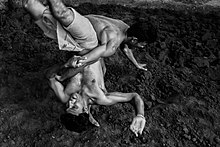
Kochi, also known by its former name Cochin, is a major port city along the Malabar Coast of India bordering the Laccadive Sea. It is part of the district of Ernakulam in the state of Kerala. The city is also commonly referred to as Ernakulam. As of 2011, the Kochi Municipal Corporation had a population of 677,381 over an area of 94.88 km2, and the larger Kochi urban agglomeration had over 2.1 million inhabitants within an area of 440 km2, making it the largest and the most populous metropolitan area in Kerala. Kochi city is also part of the Greater Cochin development region and is classified as a Tier-II city by the Government of India. The civic body that governs the city is the Kochi Municipal Corporation, which was constituted in the year 1967, and the statutory bodies that oversee its development are the Greater Cochin Development Authority (GCDA) and the Goshree Islands Development Authority (GIDA).

Ernakulam is one of the 14 districts in the Indian state of Kerala, and takes its name from the eponymous city division in Kochi. It is situated in the central part of the state, spans an area of about 2,924 square kilometres (1,129 sq mi), and is home to over 9% of Kerala's population. Its headquarters are located at Kakkanad. The district includes Kochi, also known as the commercial capital of Kerala, which is famous for its ancient churches, Hindu temples, synagogues and mosques.

Kollam, is an ancient seaport and the fourth largest city in the Indian state of Kerala. Located on the southern tip of the Malabar Coast of the Arabian Sea, the city is on the banks of Ashtamudi Lake and is 71 kilometers northwest of the state capital, Thiruvanathapuram (Trivandrum). Kollam is one of India's oldest continuously inhabited cities, with evidence of habitation stretching back to the megalithic; the city has also been a maritime entrepôt millennia, the earliest attestation of which dates back to the Phoenicians and Romans. It is the southern gateway to the Backwaters of Kerala, and is known for its cashew processing, coir manufacturing, and tourism industries.

Pehlwani, also known as Kushti, is a form of wrestling contested in the Indian subcontinent. It was developed in 14th century by combining Persian Koshti pahlevani with influences from native Indian Malla-yuddha. The words pehlwani and kushti derive from the Persian terms pahlavani (heroic) and koshti respectively, meaning Heroic wrestling. A practitioner of this sport is referred to as a pehlwan while teachers are known as ustad.
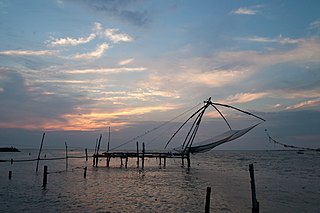
Fort Kochi, formerly known as Fort Cochin or British Cochin is a neighbourhood of Cochin (Kochi) city in Kerala, India. Fort Kochi takes its name from the Fort Manuel of Cochin, the first European fort on Indian soil, controlled by the Portuguese East Indies. This is part of a handful of water-bound islands and islets toward the south-west of the mainland Kochi, and collectively known as Old Kochi or West Kochi. Adjacent to this is the locality of Mattancherry. In 1967, these three municipalities along with a few adjoining areas, were amalgamated to form the Kochi Municipal Corporation.

The Jawaharlal Nehru International Stadium, also known as Kaloor Stadium, is a multi-purpose stadium in Kochi, Kerala, India. Since the 2017 renovation, the stadium has a seating capacity of 41,000. Previously, it was able to host 80,000 spectators, which was reduced for the Indian Super League (ISL) matches due to security reasons. It is the home ground of the ISL club Kerala Blasters FC. The stadium is touted to have hosted one of the loudest audiences for association football matches in the world.

The Kochi Municipal Corporation is the municipal corporation that manages the Indian city of Kochi in the state of Kerala. The Corporation manages 94.88 km2 of Kochi city and has a population of 677,381 within that area. It is the most densely populated city corporation in the state. Kochi Municipal Corporation has been formed with functions to improve the infrastructure of town.
Kochi, formerly known as Cochin, is a city and port in the Indian state of Kerala.
Many sports are played by the people in Kerala including both traditional sports and sports from other countries. Association football is the most popular sport in Kerala, followed by cricket. Kerala Blasters are the most supported football club in the whole state and participates in the Indian super league the top tier of Indian football. Whereas Gokulam Kerala FC a club which plays in the I-league derives most of its support from the Malabar region. However, larger numbers of Keralites also follow sports such as volleyball, hockey, badminton, and kabaddi. There are many large stadiums in Kerala across different cities. Trivandrum city has various sports venues such as Trivandrum International Stadium, Jimmy George Indoor Stadium, University Stadium (Thiruvananthapuram), Chandrasekharan Nair Stadium and Central Stadium whereas Kochi city has stadiums such as Jawaharlal Nehru International Stadium (Kochi) and Rajiv Gandhi Indoor Stadium. An international astro turf hockey stadium is located at Kollam city. Other major stadiums are EMS Stadium in Kozhikode, Malappuram District Sports Complex Stadium in Manjeri, Kannur Indoor Stadium in Kannur, Lal Bahadur Shastri Stadium in Kollam and many more. All these stadiums attest to the mass appeal of such sports among Keralites.
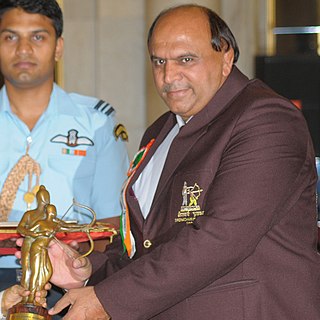
Satpal Singh, also known as Guru Satpal, is a wrestling coach and former wrestler of India. He was a gold medalist in 1982 Asian Games and a bronze medalist in 1974 Asian Games. Today he is better known as the coach of Olympic medal winners Sushil Kumar and Ravi Kumar Dahiya.
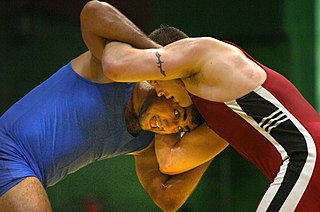
Wrestling is one of the oldest sports in India. Several regional styles and variations in folk wrestling exists in the country. Indian wrestlers have won numerous medals at international competitions in freestyle wrestling.

The following outline is provided as an overview of and topical guide to Kerala:
Kerala Seaplane was a commercial seaplane service promoted by Kerala Tourism Infrastructure Limited in the Indian state of Kerala. It was launched on 2 June 2013 at Kollam with the inaugural flight being operated by Kairali Aviation. However, commercial operations could not start due to opposition from the local fishing community. The Kerala Government was keen on restarting regular operations of the project in 2014. The service was to be the first such service in mainland India, and the second in India after Jal Hans, which operates seaplanes in the Andaman and Nicobar Islands. Work on the Kerala seaplane project began at the end of July, 2012 and has been praised for being one of the fastest projects to be completed in Kerala.
The Kerala Premier League is a state-level football league organized by the Kerala Football Association and played in the state of Kerala, India. For sponsorship reasons it is officially known as the Scoreline Kerala Premier League. Founded in 1998, the Kerala Football League was the first football league in Kerala, and was rebranded in 2013 as the KPL. Kerala United is the current champion.
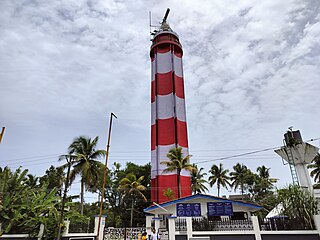
The Vypin Lighthouse or Cochin Lighthouse is situated at Puthuvype in Kochi, Kerala. India. It started as an oil-fuelled lamp at Fort Kochi in 1839, and was updated over the years. It was replaced by a structure in Puthuvype in 1979. It is the tallest lighthouse in Kerala.
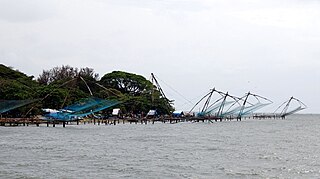
Fort Kochi beach is a beach along the Arabian Sea situated in Fort Kochi in the city of Kochi in South India, Kerala state.
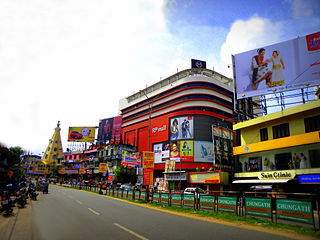
Kollam or Quilon is an old seaport and a city on the Laccadive Sea coast in Kerala, India, on Ashtamudi Lake. The city remains notable as the ancient commercial capital of Kerala and the southwestern Indian coast, in addition to its fame as the "Cashew Capital of the World". The Kollam Municipal Corporation has the second largest budget in Kerala in terms of revenue and expenditure.

Cochin Carnival is an entertainment event held every year in the last week of December at Fort Kochi in the city of Kochi, Kerala. This event is held mostly during the last two weeks of December and finally ends on 1 January. It is officially inaugurated with hoisting the Indian national flag at the Vasco da Gama Square.
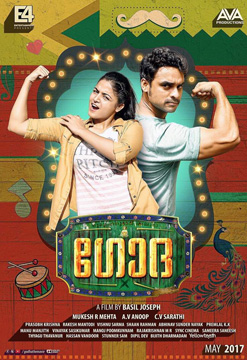
Godha (transl. Arena) is a 2017 Indian Malayalam-language sports comedy film directed by Basil Joseph and written by Rakesh Mantodi, and jointly produced by AVA Productions and E4 Entertainment. The film stars Tovino Thomas, Wamiqa Gabbi, Aju Varghese and Renji Panicker. The plot follows Aanjaneya Das, son of a gatta gusthi coach, who brings home Aditi Singh, a Punjabi wrestler. Godha was released on 19 May 2017.
